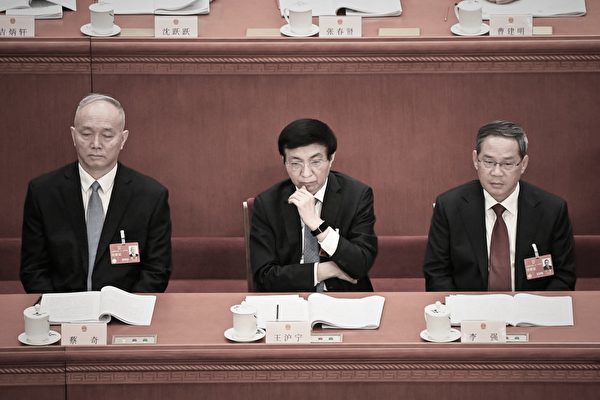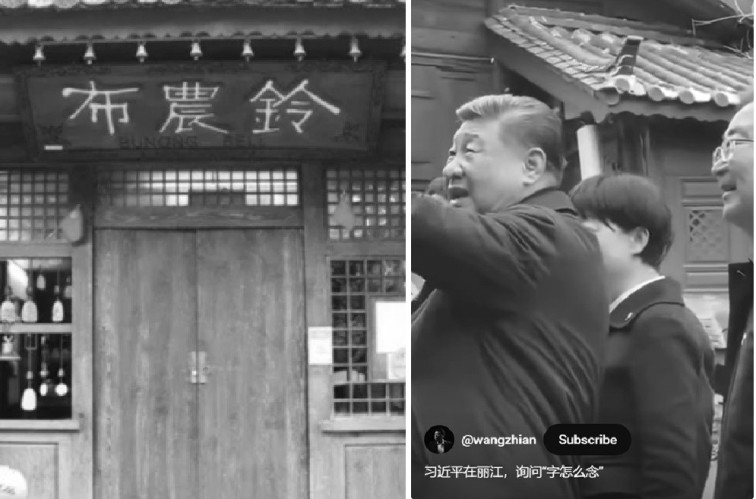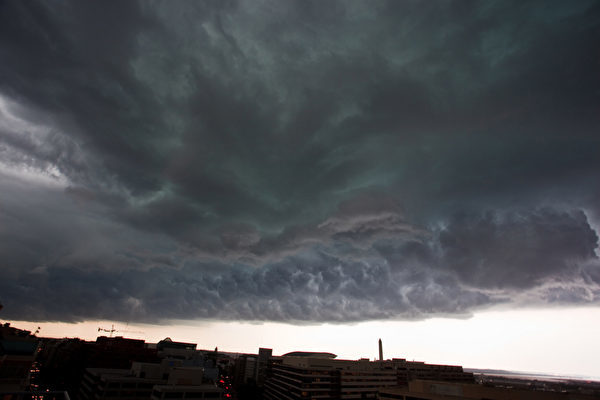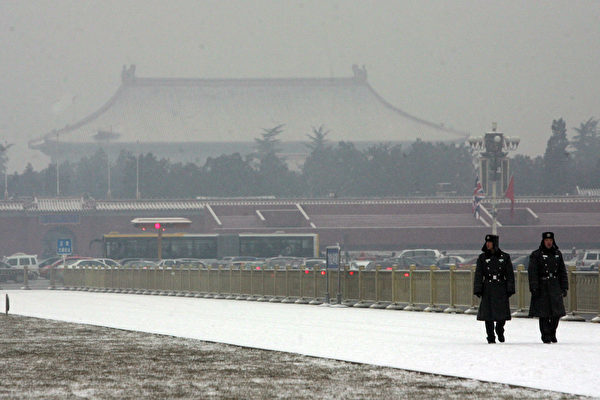The "PLA Party Building Conference" of the Chinese Communist Party (CCP) was held in Beijing from July 20 to 21. He Weidong, Liu Zhenli, Miao Hua, and Zhang Sheng were seated on the podium. CMC Vice Chairman Zhang Youxia was absent. (Screenshot from CCTV video)
[People News] The ongoing purge of senior Chinese Communist Party (CCP) military officials continues to reveal shocking developments. Since journalist Zhao Lanjian exclusively reported on the X platform that Vice Chairman of the Central Military Commission (CMC) He Weidong had been arrested, multiple sources have indicated a high probability that He is in trouble. Not only has well-known commentator Cai Shenkun received highly reliable information confirming that He has already been purged, but both the U.S. and Chinese defense ministries have recently hinted at He's removal.
On March 25, The Washington Post reported that two U.S. Department of Defense officials confirmed that Xi Jinping is conducting a political purge against He Weidong. The Epoch Times, citing The Washington Post, noted that a senior defense official stated that the purge of He is part of Xi Jinping’s political campaign, as Xi does not trust his most senior military commanders. The official explained that Xi is concerned about these commanders' lack of absolute ideological loyalty.
A second official analyzed that among the two vice chairmen of the CMC, one is typically a political commissar. However, both He Weidong and Zhang Youxia were promoted as military commanders rather than political commissars, meaning neither has a background in political work and both focus more on military operations. The senior defense official noted that Xi is worried that military leaders might undermine his authority, which is why a political commissar is needed to ensure all decisions align with the CMC and the CCP.
Xi Jinping’s moves against CMC Vice Chairman He Weidong and the head of the CMC Political Work Department are seen as part of his Stalin-style political purge. Such purges are particularly intense and ruthless within the military because the CCP’s power and the paramount authority of its leader rely entirely on absolute control over the armed forces. Recently, reports have surfaced that Xi’s loyalist 31st Army Group has been completely dismantled. He Weidong, Lin Xiangyang, and Miao Hua all hail from the 31st Army. According to journalist Zhao Lanjian, within ten days following the Two Sessions (China’s annual parliamentary meetings), over 100 military generals were taken down.
At present, Chinese state media have not disclosed any information about the downfall of CMC Vice Chairman He Weidong. Since the conclusion of the Two Sessions, He has disappeared from public view. However, according to Taiwan’s Central News Agency, during the Chinese Ministry of Defense’s regular press conference on March 27, ministry spokesperson Wu Qian responded to media inquiries about The Washington Times report on He Weidong’s alleged investigation and removal, stating, “I have no information on this matter and am not aware of the situation.”
Central News Agency also reported that when asked by Japan’s Asahi Shimbun about the case of CMC member and Director of the CMC Political Work Department Miao Hua—who was reportedly suspended last December for serious disciplinary violations—Wu Qian merely responded, “I have no information to release.”
The response from the Ministry of National Defense of the Communist Party of China regarding the downfall of He Weidong and the developments in the Miao Hua case is notably unusual, appearing to subtly affirm the reality of these events.
Had He Weidong not faced any issues, the Ministry of Defense spokesperson would typically not resort to such vague and non-committal answers. At a routine press conference in November 2024, Wu Qian announced that Miao Hua was implicated in serious disciplinary violations and, following deliberation by the Party Central Committee, it was decided to suspend him for investigation. Concurrently, when the Financial Times reported that Chinese Defense Minister Dong Jun was under investigation, a reporter inquired about the Communist Party's stance on this matter. Wu Qian categorically denied the reports, asserting that they were 'entirely fabricated, and the motives of the rumor-mongers are suspect. The Chinese side expresses strong dissatisfaction with such slanderous actions.'
During the time when former Central Military Commission member and Defense Minister Li Shangfu was in trouble, state media also chose to remain silent. Li Shangfu was appointed as the new Defense Minister during the Two Sessions in March 2023, but just six months later, he mysteriously disappeared. In October of that year, when foreign media questioned Wu Qian, the spokesperson for the Ministry of National Defense, about whether Li Shangfu was under investigation for corruption and if he still held the position of Defense Minister, he simply replied, 'I am not aware of the situation you mentioned.'
Currently, Wu Qian, the spokesperson for the Ministry of National Defense of the Communist Party of China, has once again responded to inquiries about whether He Weidong has been ousted with the dismissive diplomatic phrase, "There is no information on this matter, and I am not aware of it," which indirectly confirms the reality of the situation. However, the transcript of the routine press conference held by the Ministry of National Defense on March 27, 2025, which was published on their official website, omitted the Q&A between foreign media reporters and Wu Qian regarding the incidents involving He Weidong and Miao Hua. This suggests that the official narrative from the Communist Party regarding the military purge remains quite vague, highlighting the intense power struggles occurring within the military.
Furthermore, the situation for Dong Jun is quite serious. Recent negative reports about him have arisen from his consecutive absences from two significant meetings in March: the plenary meeting of the State Council chaired by Premier Li Qiang and the symposium commemorating the 20th anniversary of the Anti-Secession Law.
On the afternoon of March 27, the Ministry of Defense conducted a routine press conference where Colonel Wu Qian announced that from March 26 to 27, the Ministry of National Defense of China held the first meeting of the Shanghai Cooperation Organization's International Military Cooperation Department in Qingdao, Shandong, with over 30 representatives from the defense departments of member countries and the SCO Secretariat in attendance. However, there were no reports online regarding Dong Jun's participation in this meeting or any statements made by him. Additionally, former Chinese Navy Lieutenant Commander Yao Cheng revealed that Dong Jun also missed this meeting of the SCO's International Military Cooperation Department, which further indicates that Dong Jun's current situation is extremely precarious.
Currently, there are widespread rumors abroad about turmoil within the Chinese Communist Party (CCP) military. High-ranking officials such as He Weidong, Zhao Keshih, Lin Xiangyang, Qin Shutong, Wang Houbin, Wang Xiubin, Wang Haijiang, Wang Peng, Wang Zhongcai, and Ding Laifu have reportedly been arrested. On March 27, the CCP officially announced that General Tang Yong, the deputy secretary of the Central Military Discipline Inspection Commission, has been stripped of his qualifications as a member of the National Committee of the Chinese People's Political Consultative Conference. This suggests that an unprecedented and intense upheaval is taking place within the CCP military, highlighting the bloody and brutal nature of the CCP's power purges.
There are currently two sharply contrasting views regarding who is orchestrating this military purge. One perspective argues that this is still Xi Jinping's initiative to continuously reorganize the military's absolute loyalty by purging those who are not entirely loyal, even if they belong to his own faction. Through these purges, Xi Jinping aims to refine his power. The opposing view posits that this is a counter-purge led by Zhang Youxia in collaboration with political elders, targeting Xi Jinping's faction in a power struggle. The Miao Hua faction of the 31st Army is currently being uprooted, pressuring Xi Jinping to relinquish power at the Fourth Plenary Session.
Both perspectives have their supporting evidence, yet they also contain elements that are difficult to reconcile. If this purge is indeed led by Xi Jinping himself, can such a self-sabotaging approach truly result in high centralization and loyalty? Furthermore, why has Zhang Youxia, who seems to be the most loyal faction to Xi Jinping, not been removed? Or is Zhang Youxia also facing a precarious situation ahead?
If it is suggested that Zhang Youxia and the political elders are mounting a counteroffensive against Xi Jinping, then one must ask why, since last year's Third Plenary Session, the power purges have remained focused on the military. Xi Jinping's political allies, including Cai Qi, Wang Xiaohong, and Chen Yixin, have not faced any repercussions, and his wife, Peng Liyuan, recently delivered a prominent written address at the World Health Organization's video conference for the 2025 World Tuberculosis Day. There are circulating rumors that Li Qiang is set to become Xi Jinping's successor, while Wang Huning is also vying for the position. This uncertainty surrounding succession is a fundamental cause of the ongoing power turmoil. Furthermore, there has been no clear stance from Zhang Youxia regarding the CCP's succession plans. Additionally, the CCP's current foreign policy, its approach to US-China relations, and the so-called strategy for becoming a technological powerhouse still reflect a strong Xi Jinping influence, which contradicts the rumors suggesting that he has completely lost power.
Given the opaque nature of the CCP's power struggles and the harsh realities of these conflicts, it is challenging for outsiders to ascertain the truth behind the situation and the core motivations driving this power oppression. It is also difficult to identify the objectives and ultimate direction of this power struggle. However, one thing is clear: the more the CCP continues to grapple with these issues, the closer it comes to its own demise. Whether facing internal strife or external challenges, and regardless of who is battling whom, they cannot escape the historical fate of being rendered obsolete. △
(First published by People News)











News magazine bootstrap themes!
I like this themes, fast loading and look profesional
Thank you Carlos!
You're welcome!
Please support me with give positive rating!
Yes Sure!